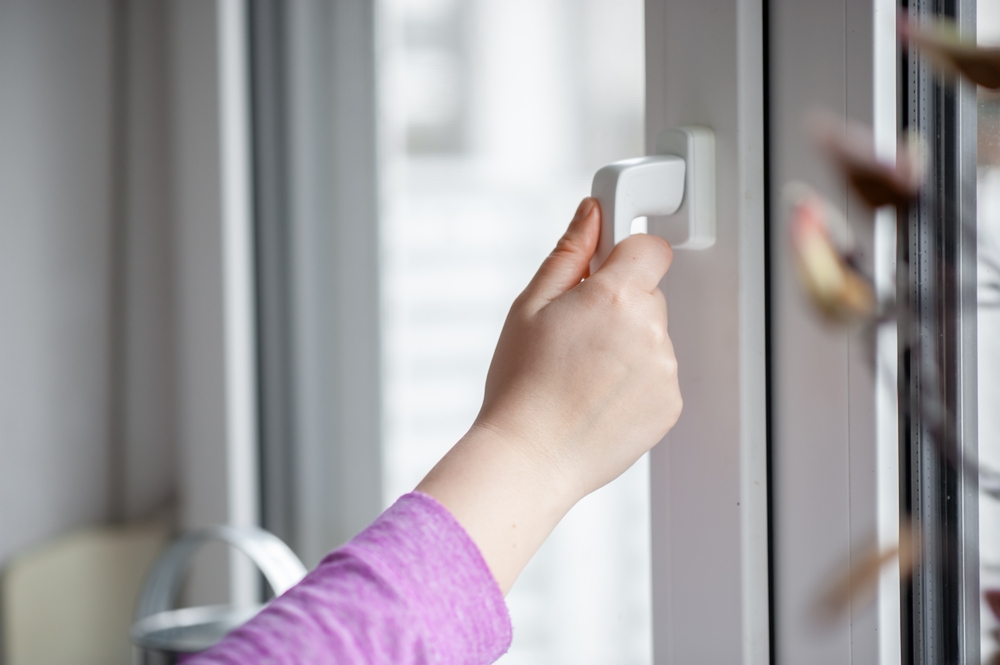
It’s a warm, humid day in Southwest Florida. Your ac is running, but the air feels a little stale, so you crack open a window to let in some fresh air. It seems harmless enough… but could this common habit be hurting your comfort, your cooling system, and your wallet?
In this post, we’ll explore what happens when you run the AC with windows open. Backed by HVAC experts and research, we’ll:
- Answer the question, “Is it okay to run the AC with windows open?”
- Explain what happens to your system’s performance
- Review when, if ever, it’s okay to crack a window
- Suggest safe alternatives for improving indoor air quality
- Bust common AC myths
- Provide expert tips for protecting your system
Let’s get started.
What Happens When You Run the AC With Windows Open?
Running your air conditioner with the windows open may feel like a way to “freshen up” your space, but it actually undermines the AC’s performance. Instead of circulating cooled air efficiently, your system is forced to battle the influx of outdoor heat, humidity, and unfiltered air.
Here’s what’s happening behind the scenes:
- Energy Waste: Cool air escapes while warm air seeps in, causing your AC to work harder and longer to maintain the set temperature.
- Reduced Cooling Performance: Airflow patterns are disrupted, preventing proper circulation across the home.
- Higher Indoor Humidity: Moist air from outside enters, raising humidity levels and making the air feel heavier and stickier.
- System Stress: Over time, this inefficiency leads to more frequent cycles, which increases wear and shortens system lifespan.
Why Keeping Windows Closed Maximizes AC Efficiency
Central air conditioning systems are designed to cool and dehumidify a sealed environment. When windows stay closed, the system can maintain steady temperatures more efficiently and cycle off once the desired setting is reached.
Open windows break what’s known as the “thermal envelope” of your home, which is the boundary that keeps indoor and outdoor air separate.
According to our experienced team, a tightly sealed home allows your AC to:
- Maintain stable temperature zones
- Remove humidity more effectively
- Prevent dust, allergens, and pollutants from entering
- Use less energy during each cooling cycle
Let’s examine what happens when you run the AC with windows open and how it impacts each part of your system.
Your AC Works Harder to Maintain the Temperature
When cool air escapes and warm air enters through open windows, your AC senses the temperature rise and continues to run. This leads to longer and more frequent cooling cycles, especially in hot and humid climates like Fort Myers.
Over time, this constant cycling strains your unit and increases electricity usage, all to fight a problem that could be avoided by simply closing the windows.
Higher Humidity Levels and Poor Comfort
Florida is known for its high humidity, and leaving your windows open allows moisture-laden air to flood your home. Even if your AC is cooling, that sticky feeling can persist. High humidity can also:
- Create an ideal environment for mold and mildew growth
- Make your home feel warmer than it is
- Aggravate allergies and respiratory issues
A properly sealed home allows your system to remove this moisture efficiently, which is key to indoor comfort.
Increased Energy Bills
Running your AC with the windows open is one of the fastest ways to drive up your energy costs. Since the system works harder and longer to cool the home, it’s using significantly more electricity than it would in a sealed space. This means:
- More wear on compressors and fans
- Higher monthly utility bills
- Reduced system efficiency over time
Even a small window crack can result in hundreds of dollars lost throughout the cooling season, especially during Florida’s long summers.
Risk of System Wear and Tear
Every time your AC turns on, its internal components experience mechanical stress. The more often it runs, the faster these parts wear down. Leaving your windows open forces the system into overdrive, which can cause:
- Premature part failure
- More frequent needs for AC repair
- Shortened overall equipment lifespan
The harder your system works, the more likely it is to need costly maintenance or early replacement.

Are There Any Situations Where Opening Windows Is Okay?
While keeping your windows closed is best for AC performance and efficiency, there are a few exceptions where it’s okay to leave a window open with the air conditioning turned off.
Let’s explore these cases.
Early Morning or Late Evening in Mild Climates
If the outdoor air is cooler and drier than the indoor air—such as early in the morning or after sunset—it may be okay to open windows briefly. Just make sure your AC is off during this time to avoid conflicting airflow and wasted energy. This tactic is most effective in spring or early fall, when temperatures are mild and humidity is low.
When Airing Out the Home Temporarily
You might open windows to vent strong odors from cooking, painting, or cleaning. This is fine for short periods, especially if you turn off the AC and use exhaust fans to speed up ventilation. Be sure to close the windows once the smell is gone to prevent overloading your system once it kicks back on.
If Using a Window AC in “Fan Mode” Only
Some window units have a “fan” or “vent” mode that circulates air without cooling. If you’re only using fan mode, opening a window may not cause as much energy waste, but it still allows heat and humidity to enter. For optimal energy savings, it’s best to use this feature only when outside conditions are favorable.
With a Zoned Cooling System in Unused Rooms
If you have a zoned HVAC system and you’re not actively cooling a particular room, opening the window in that space may have limited impact on the rest of the home. Just remember: open windows anywhere can still disrupt humidity balance and pressure levels across the system.
Window AC Units vs. Central AC: Does It Make a Difference?
Not all cooling systems respond the same way to open windows. The type of AC you have can influence how much impact windows have on comfort and efficiency.
Central HVAC Systems Require Sealed Spaces
Central air conditioning relies on ductwork to distribute conditioned air evenly throughout the home. When windows are open, air pressure drops and distribution becomes uneven. You’ll likely notice hot and cold spots, humidity fluctuations, and longer cooling cycles—all signs that your system is compensating for air loss.
Portable ACs and Window Units May Be More Tolerant, But Not Efficient
These systems cool a single room and often pull in outside air during the process. While they can tolerate brief window openings better than central systems, they’re still not designed to cool a leaky space. You’ll notice reduced cooling performance and louder operation as they struggle to meet the set temperature.
Mini-Splits Still Need Closed Zones to Function Correctly
Ductless mini-splits operate in specific zones and rely on closed doors and windows to regulate individual room temperatures. Opening windows allows outside air to interfere with those microclimates, leading to inconsistent temperatures and wasted energy.
Common Myths About AC and Ventilation
Let’s clear up some popular but misleading beliefs about air conditioning and airflow.
Myth #1: “Cracking a window helps the AC breathe.”
False. Your AC doesn’t need fresh outside air to operate. In fact, open windows reduce system efficiency by allowing unconditioned air to enter and cooled air to escape.
Myth #2: “Fresh air helps eliminate stuffiness indoors.”
While it can, your AC isn’t the right tool for this. Bringing in outdoor air without proper filtration can worsen allergies, increase humidity, and compromise indoor air quality.
Myth #3: “Leaving a window open balances indoor pressure.”
Not true. Residential HVAC systems are not designed for pressurization like commercial buildings. Open windows disrupt airflow patterns rather than balance them.
Alternatives to Opening a Window for Fresh Air
Now that we understand what happens when you run the AC with windows open, here are some HVAC-friendly ways to refresh your indoor space.
Use Exhaust Fans in Kitchens and Bathrooms
These fans help remove steam, odors, and pollutants right at the source. Turn them on while cooking or showering to reduce the need to open windows.
Install an Energy Recovery Ventilator (ERV)
ERVs exchange stale indoor air with filtered outside air while preserving temperature and humidity levels. They’re ideal for homes in humid climates like Southwest Florida and pair perfectly with central AC systems.
Use a Whole-Home Air Purifier
These systems clean the air throughout your home by removing dust, allergens, and volatile organic compounds (VOCs). If stale air is a concern, an air purifier offers peace of mind without sacrificing efficiency.
Replace HVAC Filters Regularly
A clogged or dirty air filter restricts airflow and can worsen indoor air quality. Change your filter every 1–3 months (depending on usage and filter type) to keep air clean and systems running smoothly.
Can Open Windows Damage Your AC System?
“Is it OK to run the AC with the windows open?”
Beyond efficiency loss, open windows can introduce dust, pollen, and moisture into your ductwork and indoor coils. Over time, this may lead to:
- Mold growth inside the system
- Corrosion of metal parts
- Reduced cooling performance
It’s also worth noting that running your AC with dirty coils or filters due to outside contaminants can void manufacturer warranties.
Should You Open Windows at Night Instead of Using AC?
Some homeowners consider shutting off the AC at night and opening windows to “save money.” While this may work in cooler, drier climates, Florida’s high humidity and allergen levels make it a risky choice.
Pros:
- Saves energy if outside temperatures are significantly cooler
- Provides natural airflow (briefly)
Cons:
- Humidity may climb overnight
- Pollen and allergens can enter
- You may wake up feeling sticky and uncomfortable
- Open windows can create security concerns
For better results, consider using smart thermostats that automatically raise the temperature at night, or install an ERV to refresh the air safely.
Contact Us for Cooling & Air Quality Services
At Gulf Shore Cooling, LLC, we understand the balance between comfort, efficiency, and clean indoor air. Whether you need a system tune-up, help improving air circulation, or expert advice on sealing your home, our team is here to help.
Explore our full range of AC services or contact us today online to schedule an appointment. We proudly serve Fort Myers, Cape Coral, and the surrounding Southwest Florida communities.
FAQ
Can leaving windows open while running the AC damage my system?
Yes. Leaving windows open while your AC is running can cause your system to work harder, leading to increased wear and tear. Over time, this can lead to dirty coils, clogged filters, and even system damage due to moisture and pollutants entering the home.
How can I freshen indoor air without opening windows?
Instead of opening windows, use exhaust fans, change your HVAC filters regularly, or invest in an ERV system or a whole-home air purifier. These solutions help remove stale air and bring in filtered fresh air without compromising your AC’s efficiency.
Should I open windows if my AC smells musty?
Not necessarily. A musty odor often indicates the presence of mold or mildew in the system or ductwork. Opening windows won’t solve the root problem. It’s best to schedule professional AC repair or maintenance to identify and fix the issue.
Should windows be open when turning the AC on for the first time in summer?
No. When you first turn on your AC for the season, keep windows closed to allow the system to properly cool and dehumidify your home. If there’s a stale smell, run exhaust fans or schedule an indoor air quality check—don’t rely on open windows to fix it.



